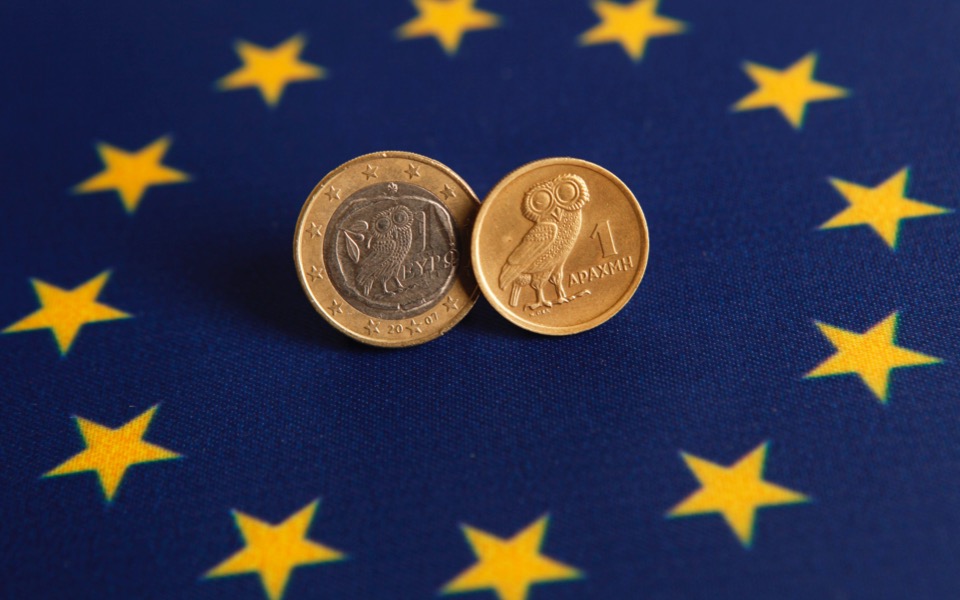Low credit score dampens recovery hopes

There have been times over the last few years when, under financial and political duress, Greeks’ appetite for remaining in the euro has waned but ultimately the desire to return to the drachma has always been the choice of a minority. There is no guarantee that public opinion will always be in favor of the single currency, especially if the much-heralded but never-seen economic recovery continues to remain elusive.
However, as things stand, after years of sacrifice, wrangling and controversy, the majority of Greeks do not want to take the risk of leaving the euro. They do not seem keen to experience even more strenuous conditions during what many economists believe will be an extremely painful and perilous period of readjustment to a national currency.
Even Prime Minister Alexis Tsipras, who a few years suggested that the discussion the possibility of leaving the euro should not be a taboo, is now encouraging Greeks to stay the course. He hopes the country, and its people, will start to come out of the dark economic period next year, when Greece is forecast to see growth of 2.7 percent.
His task would probably be easier if the tell-tale signs that Greece already finds itself in some kind of eurozone purgatory did not keep cropping up. In this column, we recently highlighted how Greece is completely out of sync with the rest of the euro area when it comes to interest rates for borrowing, both for individuals and companies. This has created the paradox that in the euro member state where businesses are most in need of liquidity, it is far more expensive for them to borrow than their competitors.
At a state level, Greece has so far been barred from the European Central Bank’s asset-purchase, or quantitative easing, program.
Another jarring contradiction was highlighted on Friday, when the ECB announced the latest figures for lending in the single currency area. According to the Frankfurt-based organization, loans to companies rose 1.9 percent year-on-year in July, which is the fastest rate in five years. Household lending also grew by 1.8 percent.
The ECB’s interest rate cuts, which have essentially led to banks being penalized for holding on to cash, have played a significant role in ensuring that lending in the eurozone has been growing since mid-2014. The increase in lending, particularly in the form of mortgages, has been vital to aiding the euro area’s economic recovery. July’s figures suggest that lending to companies is now also playing a significant part in steering the euro economy in the right direction.
Again, though, Greece is the exception. The country’s lending data for July indicated that credit had contracted by 1.6 percent on an annual basis. Although this represents a slower contraction than the 2 percent seen in June, the figures still make for pretty miserable reading and confirm that bank credit in Greece has seen negative growth since early 2011. The contrast with the rest of the eurozone is stark.
Lending to Greek corporations was -0.4 percent year-on-year in July; a far cry from the experience in the rest of the countries sharing the single currency. Credit to individuals, meanwhile, contracted by 2.8 percent in Greece last month.
To compound the problems created by the lack of lending, Greece is also pinned down by the ongoing challenge of dealing with past lending that turned sour. The Bank of Greece’s most recent data showed that the non-performing exposure (NPE) ratio for the loans banks hold was at a dizzying 45.1 percent in the first quarter of this year. Incredibly, when taking consumer loans on their own, the majority (55.2 percent) are non-performing. A further breakdown of NPEs shows that 44.6 percent of corporate loans and 42 percent of housing loans are non-performing.
By way of comparison, it is worth considering that in Italy, where many fear a banking crisis breaking out and the next eurozone crisis hot spot emerging, the equivalent ratio for all loans is less than 20 percent. Meanwhile, in the US even at the peak of the financial crisis several years ago, the proportion of loans considered non-performing reached around 5 percent.
In Greece, at the same time that credit is contracting, banks are increasing their bad loan provisions. Bank of Greece figures published earlier this month show that Greek lenders increased these provisions by 886 million euros in the first half of this year. In total, the amount that Greek banks have set aside in loan loss reserves, which is used to cover estimated losses on bad loans, stood at 46.5 billion euros at the end of June.
This gives an indication of how backed up the Greek banking system is, unable to operate as a credit provider or in any other way one would expect from its eurozone peers.
In the months ahead, and with Greece’s next bailout review pending, unblocking the local banking system will be a vital task. If the country is to have any hope of achieving next year’s ambitious growth target, or even of getting close to it, then credit has to start flowing again. If Greece is to start feeling like a member of the eurozone again, then its banking system has to begin operating like it is part of the single currency.





